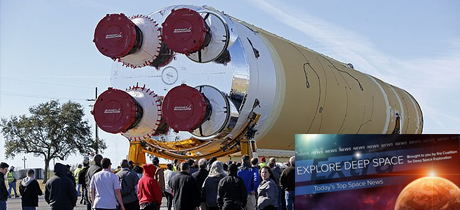In Today’s Deep Space Extra… NASA is now targeting January 16 for the final test in the SLS rocket Green Run campaign. The agency also joined Boeing in announcing plans to equip the International Space Station (ISS) with new solar arrays.
Human Space Exploration
DATE CHANGE: SLS CORE STAGE HOT FIRE TEST, January 16, 2021, Stennis Space Center, MS
Spacepolicyonline.com (1/11): Following a test readiness review on Monday, NASA is now targeting Saturday, January 16, for the final step in the Green Run testing series for the core stage of the Space Launch System (SLS) rocket that will launch the Artemis I mission. The test was previously planned for January 17. NASA will be hosting a teleconference today to discuss the test at 1 p.m. EST. Audio will stream at http://www.nasa.gov/live.
Boeing to boost Space Station power supply with new solar arrays
Coalition Member in the News – Boeing
Collectspace.com (1/11): Boeing on Monday announced it will be providing six additional solar arrays for the International Space Station (ISS). Combined with the eight original arrays, the new hardware will provide a 20 to 30 percent increase in power, helping to maximize the station’s capabilities. The solar array upgrades are being carried out under a contract modification to Boeing’s ISS sustainment contract with NASA.
Space Science
Japanese asteroid-sampling probe begins long trek to next space rock
Space.com (1/11): In early December, the Japan Aerospace Exploration Agency’s (JAXA) Hayabusa 2 mission successfully dropped off samples of asteroid Ryugu into Australia as it sped past the Earth toward a new destination, the small asteroid 2001 CC21.The encounter date with 2001 CC21 is 2026, followed by a flyby of asteroid 1998 KY26 in 2031. Earlier this month, the Hayabusa 2 probe activated its ion propulsion system in order to carry out the challenge.
Astronomers reevaluate the age of the universe
Space.com (1/9): A recent look at the age of the universe places its inception at 13.77 billion years, give or take 40 million years. Two years ago, a science team using data from the Planck space observatory suggested the universe is possibly 13.8 billion years old. Another team of astronomers led by Cornell University used data from the Atacama Cosmology Telescope to settle the debate. Their estimate of about 13.77 billion years roughly matches the estimate from the Planck team.
Other News
European space in a time of transition
Coalition Member in the News – United Launch Alliance
The Space Review (1/11): In Europe, the space scene is undergoing a transition. And though the European investment in space is set to increase, the rise will be at levels less than proposed due in large part to the coronavirus pandemic.”
Bad weather leaves SpaceX Dragon stuck at Space Station
Futurism.com (1/11): SpaceX’s attempt to end a Dragon resupply mission to the International Space Station (ISS) with a splashdown in the Atlantic Ocean off Florida’s coast was postponed early Monday because of adverse weather. Previous Dragon missions have descended into the Pacific Ocean. A first-ever attempt to splash down in the Atlantic intends to reduce the time that returning science experiments are presented to science teams. Undocking from the ISS is now targeted for 9:05 a.m. EST today: http://www.nasa.gov/live.

